
Us pet owners love taking care of our furry companions, and who can blame them us? The companionship and affection pets provide is truly heartwarming, especially when it comes to cats!
One of the best ways to show love and care for your cat is by choosing the right cat food. Cat owners have a variety of options, from processed cat foods to raw, natural diets. In more recent years, pet owners have been getting inspired by the idea of feeding cats as nature intended, which is with raw cat food.
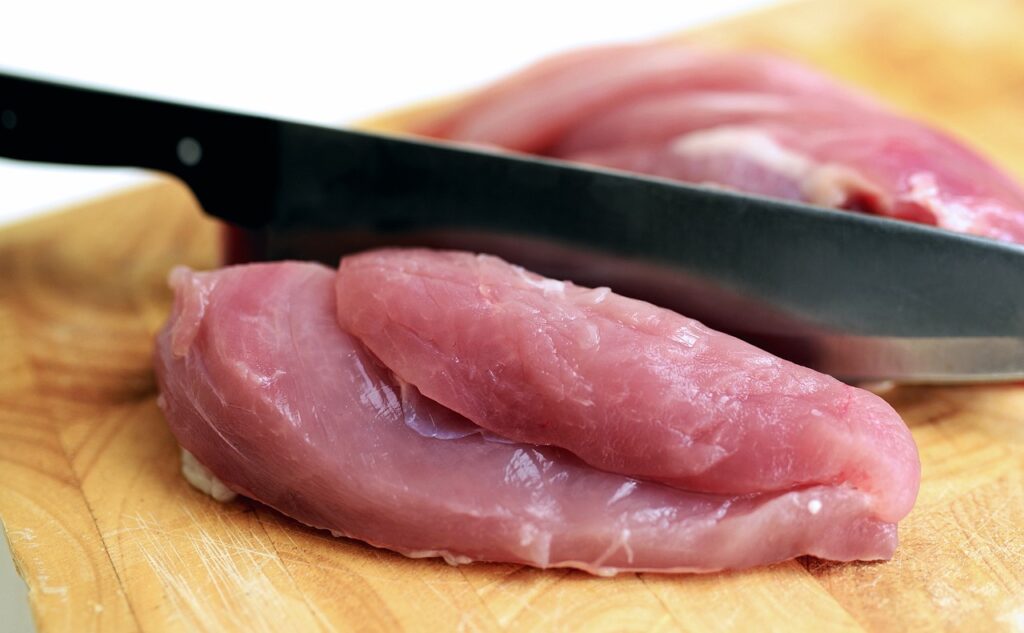
Cats are obligate carnivores, which means they thrive on diets rich in animal protein. This is why selecting the best food for them can make a big difference in their health and happiness.
According to a survey conducted in 2016, 4% of cat owners bought raw cat food for their cats. Now currently, this number has since gone up to about 10%! This is a huge indication that raw cat food diets are becoming more popular and widely accepted for cats.
So, which raw cat food should you choose?
We know that finding a nutritionally balanced raw option can be challenging, especially if you’re new to this feeding style.
That’s why we’ve put together this review of the best raw cat food options along with a helpful guide! Our goal is to help you make informed choices that support your cat’s health and well-being.
Ready? Let’s dive in!
Buyer’s Guide: How to Choose the Best Raw Cat Food

What Is a Raw Cat Food Diet?
Ever heard the joke that all cats are just smaller versions of lions and tigers? There’s some truth to that!
Your little furball at home shares a lot in common with their wild cousins when it comes to diet. Cats are obligate carnivores, which means they need meat to thrive. Unlike wild cats, though, your house cat doesn’t need to hunt for their meals. That’s where a raw food diet comes in.
A raw food diet mimics what cats would eat in the wild: meat, organs, and sometimes bones. It’s about getting back to their roots and giving them the nutrition their bodies are naturally built for. Whether you make raw cat food at home or buy it pre-packaged, the goal is the same—to provide balanced, natural nutrition that helps your cat live their best life.
If you’re new to raw pet food, it can feel overwhelming at first. Don’t worry; this guide will help you make the best choice for your cat.

Things to Consider Before Buying Raw Cat Food
Before you dive into raw feeding, take a moment to think about what works best for you and your cat. Here are a few questions to ask yourself:
Do I Have the Time?
Raw feeding can be a bit of a commitment, especially if you’re preparing homemade meals or defrosting frozen options. If you’re strapped for time, freeze-dried raw cat food might be a better fit since it’s quicker to prep.Is My Cat Active?
Does your cat zoom around the house like they’re training for a marathon, or are they more of a professional napper? Active cats, especially outdoor ones, burn more calories and might need a more calorie-dense raw food diet, while indoor cats may do better with a lighter option.How Old Is My Cat?
Kittens have different nutritional needs than adults or seniors. They need more protein and fat to grow, while older cats might benefit from easily digestible options. Make sure the raw cat food you choose matches your cat’s life stage.Does My Cat Have Any Digestive Issues?
If your cat has a sensitive stomach or food allergies, you’ll want to choose raw cat foods with limited ingredients or novel proteins like rabbit or venison.What Does My Cat Like?
You know your cat best. Are they picky eaters? Do they prefer chicken over fish? Paying attention to their preferences can save you money and frustration when switching to raw cat food.
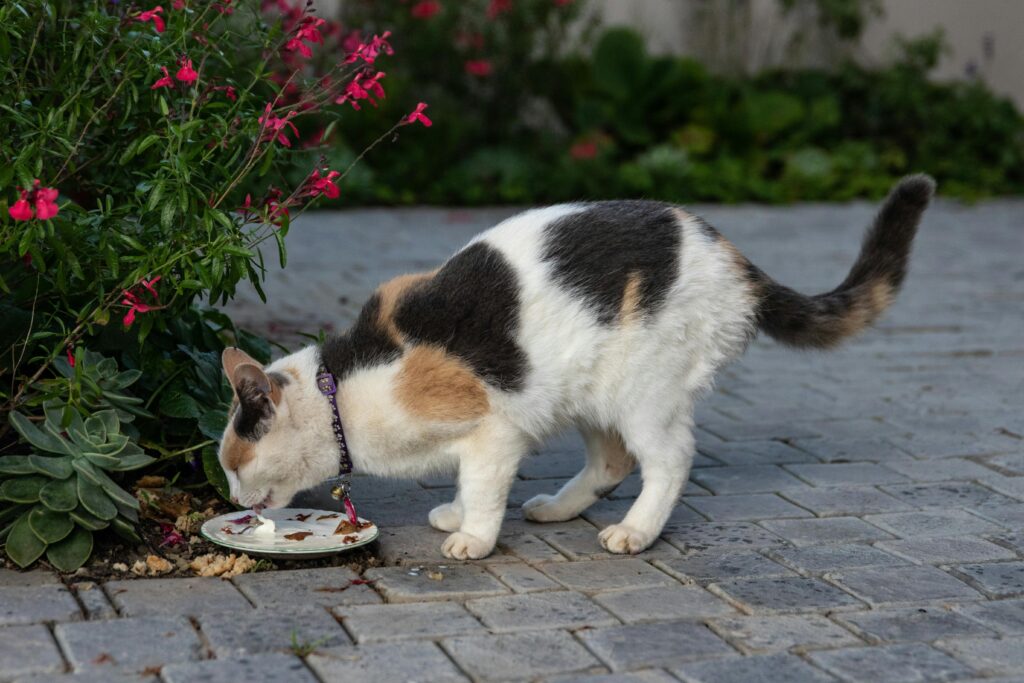
What to Look for in Raw Cat Food
Once you’ve got a sense of what your cat needs, here’s what to focus on so you can choose the best raw cat food:
Check the Label
The label is your best friend. It tells you what the food is made of, who it’s for (kittens, adults, or seniors), and how to store and serve it. You’ll also find important info like whether it’s a complete meal or a topper.Look at the Ingredients
The first five ingredients on the label matter most since they make up the bulk of the food. Aim for raw cat foods where the top ingredients are high-quality proteins like chicken, beef, or rabbit. Bonus points if it includes organ meats like liver for added nutrients.Pay Attention to Protein Content
Cats need protein to survive, at least 30% for adults and more for kittens. The more animal-based proteins, the better. Skip anything with lots of fillers like corn, wheat, or soy since they contain a high amount of carbohydrates and sugar.Consider Digestibility
A good raw cat food is easy for your cat to digest. You’ll know the food isn’t working if your cat’s poop is large, smelly, or irregular. Stick to foods without fillers or artificial preservatives to keep things running smoothly.Check the Brand
Trust matters. Look for brands with a solid reputation and certifications like “grass-fed,” “free-range,” or “organic.” These labels indicate quality and ensure you’re getting safe, healthy food.
Transitioning Your Cat to a Raw Diet
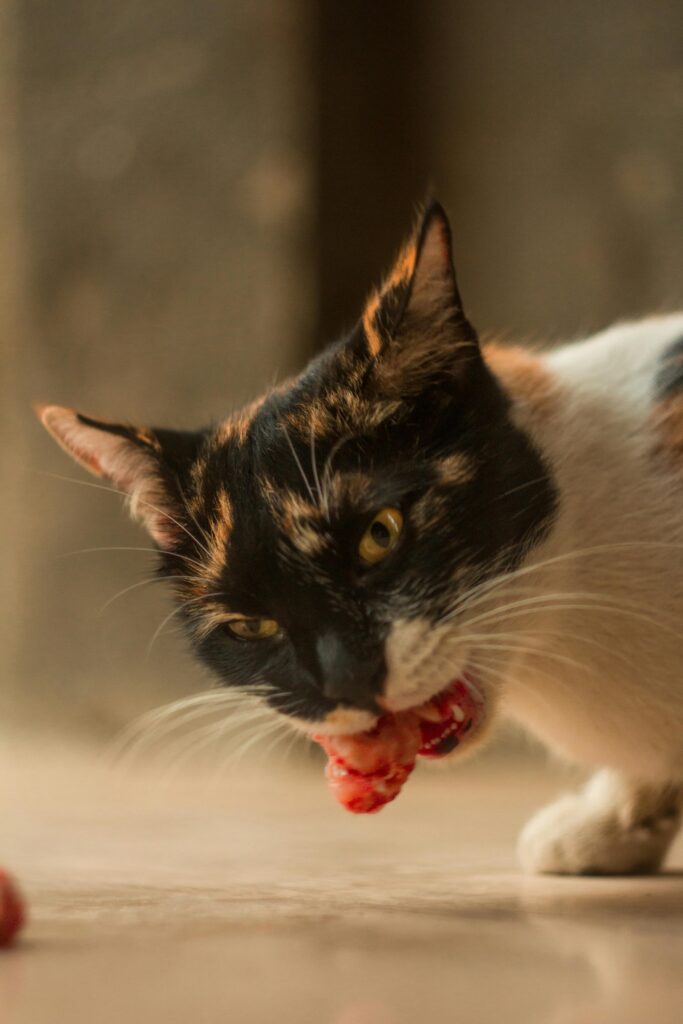
Switching to new food, let alone a fully raw diet takes some patience, but the payoff is worth it. Here’s how to introduce raw food to your cat:
Start Slow: Mix a small amount of raw cat food with your cat’s current food.
Increase Gradually: Over the next week or two, slowly increase the raw portion while decreasing the old cat food.
Monitor Closely: Keep an eye on your cat’s stool, appetite, and overall behavior. If you notice any issues, slow down the transition.
Store Safely: Keep the raw foods frozen or refrigerated to maintain their freshness and prevent any contamination.
It might take your cat a little time to adjust, but don’t get discouraged. Cats can be stubborn about new things, but with patience, most will come around.
At a Glance: Best Raw Cat Foods To Buy
When it comes to raw cat foods, finding a high-quality, balanced option can be challenging. Here’s a breakdown of our top picks for the best raw cat foods, covering a range of needs from freeze-dried to frozen varieties.
Overall Best Raw Cat Food

Instinct Raw Meals Chicken Recipe
Our top choice for the best raw cat food is Instinct Raw Meals Chicken Recipe, known for its high-quality ingredients and versatility.
Why We Like It:
Made with freeze-dried chicken bites
Can be used as a meal, topper, or standalone treat
Contains real, natural ingredients without fillers
Pros:
High protein content
No artificial additives
Versatile usage
Cons:
May not appeal to all cats due to texture
Best Grain-Free Raw Cat Food

Stella & Chewy’s Freeze-Dried Raw Cat Dinner Morsels
Stella & Chewy’s is an excellent grain-free cat food choice with a balanced formula that prioritizes high-quality raw ingredients.
Why We Like It:
Uses raw meat without added hormones or antibiotics
Formulated with essential nutrients, including taurine, for overall health
Easy to digest for sensitive stomachs
Pros:
No grains, hormones, or antibiotics
Balanced and complete nutrition
Supports healthy digestion
Cons:
Slightly more expensive than other options
Best Freeze-Dried Raw Cat Food Treats

Northwest Naturals Freeze-Dried Raw Cat Food Nibbles
Northwest Naturals offers three varieties which are chicken, turkey, and duck—each designed to be nutritious and easily stored.
Why We Like It:
Contains high protein with minimal carbs
Free from chemicals, hormones, and preservatives
Multiple flavor options to suit different tastes
Pros:
Long shelf life
Suitable as a standalone meal or treat
All-natural with no additives
Cons:
Texture may be off-putting for some cats when rehydrated
Best Budget Option

Vital Essentials Vital Cat Freeze-Dried Patties
Vital Essentials provides affordable, high-quality raw cat food without compromising nutrition.
Why We Like It:
Farm-raised and cage-free ingredients like chicken and rabbit
No artificial colors, fillers, or additives
Available in a variety of flavors at a budget-friendly price
Pros:
Grain-free
Affordable compared to similar brands
High-quality protein source
Cons:
Rabbit flavor tends to be pricier
Texture may vary between flavors
Best Exotic Flavor Option

The New Zealand Natural Pet Food Co. Meow Beef & Hoki
This freeze-dried cat food combines unique ingredients like hoki, a white fish native to New Zealand, with beef for a nutritious and novel flavor.
Why We Like It:
Contains exotic proteins for cats that don’t tolerate poultry well
No artificial preservatives and packed with essential nutrients
Pros:
High protein content
Great for cats with poultry sensitivities
Natural and preservative-free
Cons:
Pricey for a small portion size
Best Raw Cat Food for All Life Stages Including Kittens

Feline Natural Chicken & Lamb Feast
Feline Natural offers freeze-dried cat food rich in protein, vitamins, and minerals, suitable for kittens and seniors alike.
Why We Like It:
Free from fillers or artificial ingredients
High protein content supports cats at every life stage
Pros:
Nutrient-dense for all life stages
Supports muscle health and growth
No artificial substances
Cons:
Comes in smaller bags, so may require frequent purchasing
Best Frozen Raw Cat Food

CountryPet Naturals Pasteurized Frozen Raw Cat Food
If your cat prefers wet food, CountryPet Naturals Pasteurized Frozen Cat Food is a top choice. This frozen cat food is packaged in tubes, allowing for easy portioning and long-lasting freshness.
Why We Like It:
Packaged in frozen tubes for easy storage
Long-lasting and maintains freshness for up to 6 weeks when refrigerated
Pros:
All-natural ingredients
No preservatives or fillers
Convenient, long-lasting storage
Cons:
Higher cost per serving compared to freeze-dried foods
Raw Cat Food: Benefits of a Raw Diet
Switching your cat to a raw foods can align them with their natural dietary needs and provide a lot of health benefits! Here’s how a raw cat food diet can support your cat’s overall health:
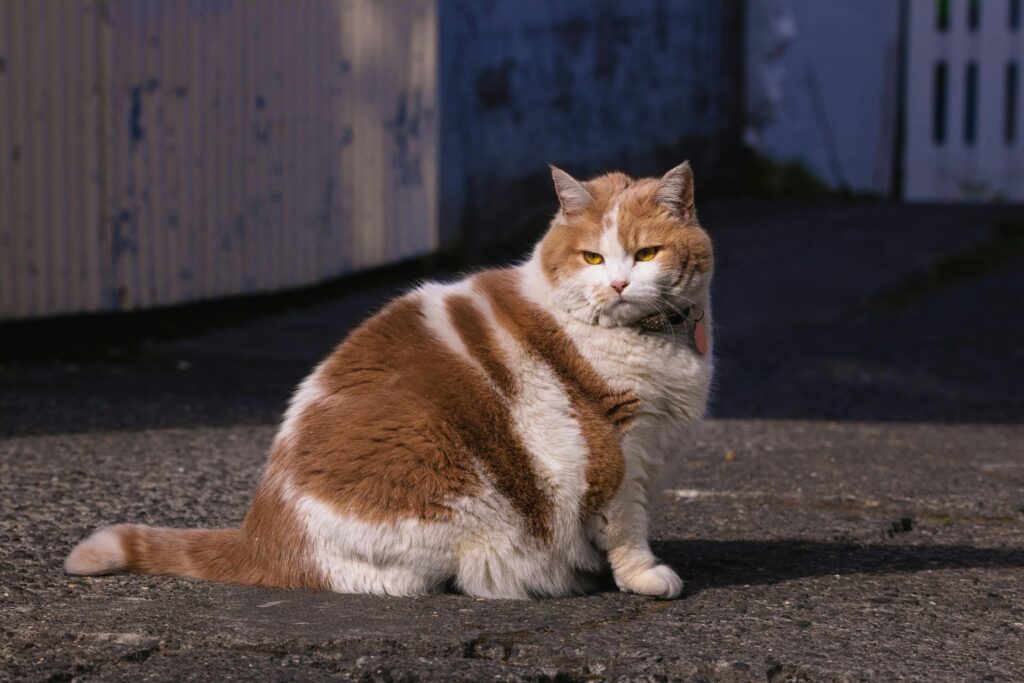
1. Weight Management
Many cats that are on regular processed diets are more prone to obesity since conventional cat foods tend to have a high amount of carbohydrates. On the other side, raw foods are naturally high in protein and low in carbohydrates, making them more aligned with a cat’s biological needs. The high protein content in raw foods keep your cat feeling full for longer, which reduces the tendency to overeat and actually encourages healthy, gradual weight loss!
Obesity is currently the most common health issue among pets in the U.S., and switching them to raw foods can be a great step toward maintaining a healthy weight and preventing obesity-related issues such as diabetes, arthritis, and cardiovascular problems.

2. Digestive Health
A regular cat diet usually consists of heavily processed foods that are loaded with artificial additives, fillers, and preservatives. This actually makes a cats digestive system work overtime, and can lead to health issues down the line. Raw food diets mimic what cats would eat in the wild, making it far easier for their digestive system to process compared to store-bought processed food diets. The natural enzymes found in raw meat help in breaking down food more efficiently, reducing the workload on your cat’s digestive system.
As your cat transitions to raw meals, you might notice improvements like firmer stools, less bloating, and less vomiting.
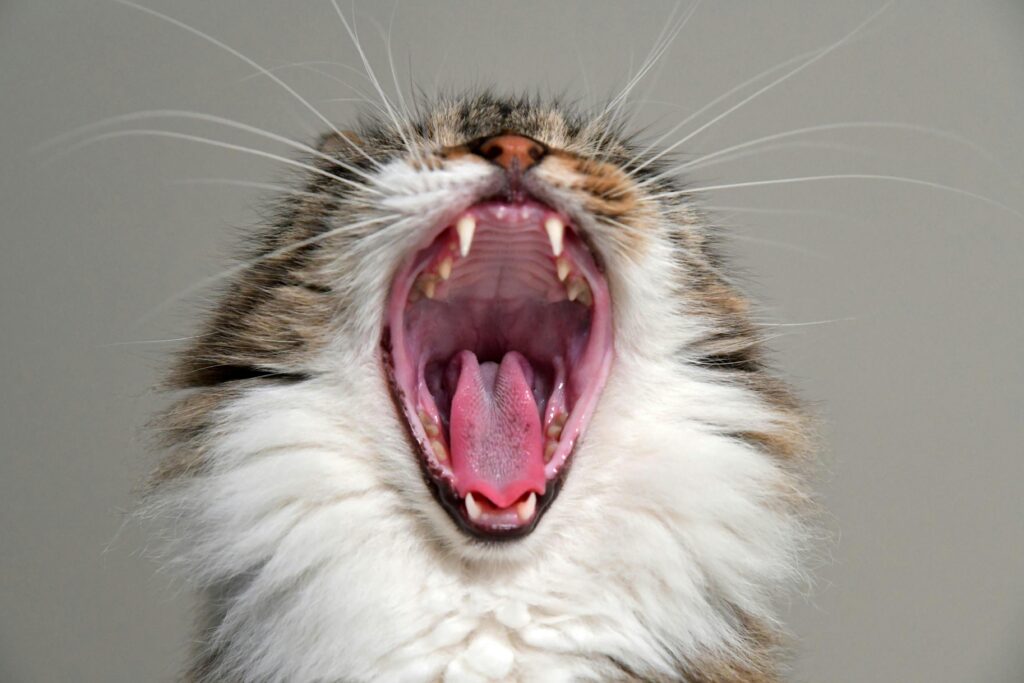
3. Better Dental Health
Many commercial cat foods contain high levels of carbohydrates and sugars, which can lead to plaque buildup, tooth decay, and gum disease. On the other end, commercial raw diets often include meaty bones or cartilage that act as a natural toothbrush, scraping away plaque and promoting healthier gums!
Over time, your cat may experience cleaner teeth, fresher breath, and a reduced risk of periodontal disease. Regular chewing on raw meaty bones also strengthens jaw muscles, contributing to better oral hygiene overall.
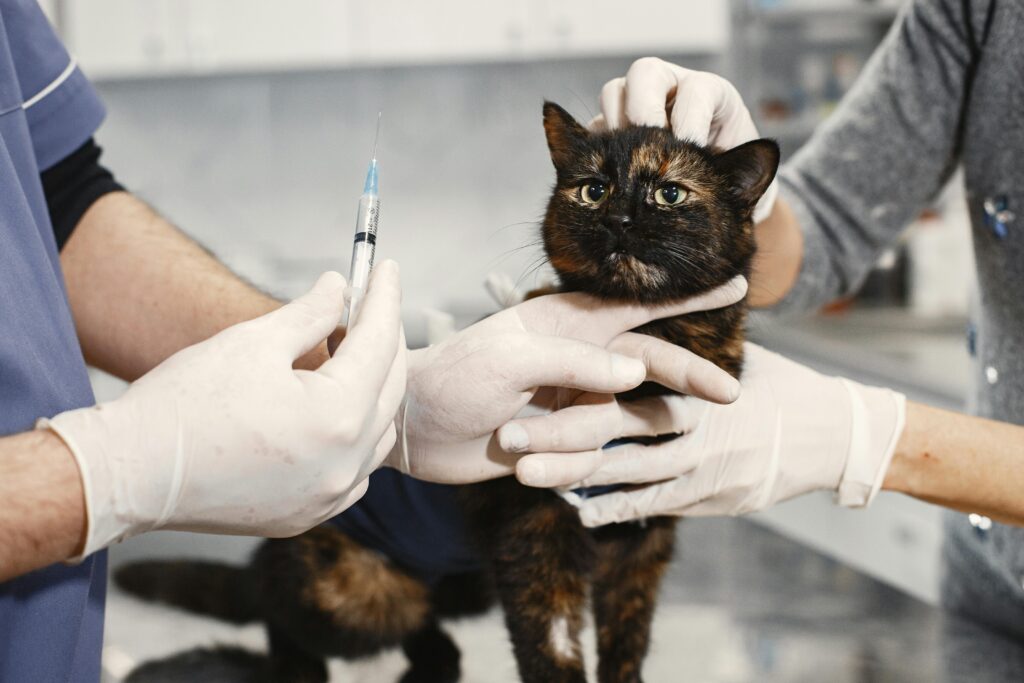
4. Strong Immune System
Raw pet food diets provide high-quality proteins, essential fatty acids and amino acids, as well as nutrients like zinc and bone marrow. These are all necessary in supporting a healthy gut microbiome and a strong immune system.
A healthy gut lining acts as a barrier for toxins and is necessary for absorbing nutrients effectively. By feeding raw food to your cat, you help their body naturally fend off infections and maintain long-term health.
Is Raw Cat Food Really A Good Choice?
Raw cat food can be a good choice for some cats, especially picky eaters who may prefer the taste and texture of raw meats over dry cat food. However, it’s important to consider your cat’s individual life stage and nutritional needs before making the switch.
Young kittens and older cats may require different nutrient ratios than adult cats, and a raw diet may not be suitable for all cats. It’s always a good idea to consult with a veterinarian before making any significant changes to your cat’s diet.
Frequently Asked Questions
Q: Is raw cat food expensive?
A: The cost of raw cat food depends on the brand and type. Some raw options are pricier than traditional commercial foods, but it’s worth considering the quality of ingredients and all the nutrients they provide. Think of it this way: other cat foods may be cheap, and while raw food may cost more upfront, it’s an investment in your cat’s long-term health and well-being.
Q: Is freeze-dried raw cat food healthier?
A: Freeze-dried raw cat food is a great middle ground if you want the benefits of raw food without the hassle of dealing with raw meat. It retains many of the same nutrients found in regular raw cat food but is easier to store and prepare. Just make sure you choose a high-quality brand that’s nutritionally complete to keep your cat healthy.
Q: What if my cat won’t eat the raw food?
A: Cats can be picky, and transitioning to raw foods might take some time. Start by mixing a small amount of the raw cat food with their regular meals and gradually increase the raw portion over 7-10 days. If your cat is still resistant, you can try different protein options or lightly warming the food to enhance its aroma. Ultimately, if raw isn’t their thing, you can find other foods that can still provide a balanced nutrition for your cat.

Q: Are there raw pet food options for kittens?
A: Yes! There is raw pet food specifically formulated for kittens. These options are packed with the nutrients young cats need for growth and development, like extra protein and fat. If you’re feeding a kitten, always check the label to make sure the food is appropriate for their age.
Q: Is raw food safe for cats?
A: Safety is a hot topic when it comes to raw feeding. While raw food diets can provide nutritional benefits and benefit digestive and immune health, they also carry a risk of bacterial contamination (like salmonella) that can harm both cats and humans. To minimize the risks, handle the raw food very carefully. Keep it frozen until it’s ready to use, wash all surfaces and bowls thoroughly, and consult your vet to make sure a raw diet is the right choice for your cat.
Q: Can cats get salmonella from raw food?
A: Unfortunately, yes. Cats can contract salmonella from contaminated raw food or surfaces. Symptoms may include vomiting, diarrhea, fever, and lethargy. If you suspect your cat has salmonella, contact your vet immediately. Always handle raw food with care to reduce contamination risks for both you and your pet.

Conclusion
Choosing the right food for your cat is one of the most important decisions you’ll make as a pet parent. A raw diet can be a fantastic option if you’re looking to give your cat a diet that’s closer to what nature intended, hunted, raw, packed with protein, essential nutrients, and none of the fillers found in many processed foods.
That said, raw feeding isn’t a one-size-fits-all solution. It requires careful consideration, a bit of patience during the transition, and a commitment to handling the food safely. Whether you choose freeze-dried food, frozen food, or a mix of raw and traditional foods, the goal is to meet your cat’s nutritional needs and keep them happy and healthy.
Ultimately, the best food for your cat is one that they enjoy, thrive on, and that works for you! If you’re ever unsure, don’t hesitate to reach out to your vet. They are your best ally in making good choices for your furry companion!
Here’s to keeping your cat purring and thriving on the diet that’s just right for them!
